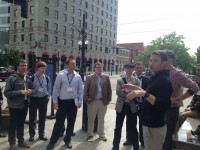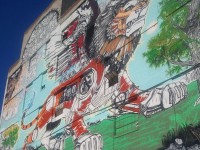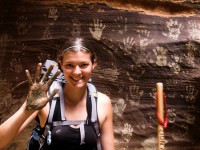Had you asked me prior to the summer of 2010 if I would ever consider living in Miami, I would have quickly answered no. I’d never been to Miami, but I’d been to Orlando, and Miami was south of that humid hot mess, and from what little I knew of it, populated by shopping malls, sprawl and body obsessed party-goers. Not really my thing. But, I was offered an incredible opportunity to work with incredible visionaries and leaders in my field, and the catch was that they were in Miami. So, I sucked it up and moved on down, expecting to hate Miami but just deal with it. And, wow, was I surprised.

I am just bursting with excitement about ioby en Miami! I’m not much of a morning person, but here I am, up and writing at 6:50 am – a time when I usually have no interest in, or awareness of, anything but my pillow.
Miami blew me away. In addition to being a tropical paradise and a cyclists dream (topographically anyhow – definitely not from a facility or safety perspective), Miami has serious assets and burgeoning energy. A young city-region, Miami-Dade is comprised of great historic centers which have seen an astonishing comeback over the past 20 years, starting with Coconut Grove and South Beach, but now having spread to almost every place with a walkable, dense, mixed use makeup – and there are many of them, having originated along the Flagler rail and streetcar lines (now defunct or torn up). The sprawl is still a major issue, the transit comes up sorely short, the government is decidedly Caribbean – don’t get me wrong, there are some serious challenges here. But there are also incredible assets and opportunities, across the board. People, especially younger people now, are moving here from all over to build, together, their own vision of how life should be lived – and, for the first time in a long time, they are intermingling with the natives. Imagine my surprise when I gushed to an awesome native Miamian about how exciting it was to meet someone doing something cool who was actually FROM Miami – and was told, in response, that she felt the same way every time she met someone doing something cool who WASN’T from Miami (Jeremy Glaezer wrote a great piece on this, here).
The native-newcomer interaction is an important one, bridging a divide that has yawned wide for decades. But, it follows on the heels of a bevy of boundary crossing uniting forces unique in this city. Add to that list the fact that we here are literally on the forefront of climate change and sea level rise – and you can begin to understand how greater Miami and South Florida in general is becoming a leader of renaissance regions.
This is just the tip of the iceberg of why I am so excited to be living and working in Miami, against all expectations. The change I have witnessed in my two short years in the city, the energy that is greater every day, the diversity and the push for change, for a better world, is so clear and central in the Miami I have come to know. But, like all great movements early in their life, much of the energy and effort is still happening in isolation, struggling to succeed. And this is where ioby comes in. The digital community-making tools and resources provided by ioby the platform are transformational – and easy to use. But, this is not necessarily unique. What truly distinguishes ioby is the people behind these tools and resources. I have what some would call a spotty employment history, as do many of my generation, because I have always pursued avocation over employment. I have always had a driving need to be putting my time and effort towards something meaningful that continued to expose me to new knowledge and experience. What I have come to know of the people behind ioby floors me. The passion, dedication and ability – not to mention enjoyment – with which they pursue their work is what has been long missing from the job market and economy. Pair this with the vision and foresight of the Miami Dade County Office of Sustainability, inviting ioby to come here and operate and help accomplish the goals of the GreenPrint plan, and the support of the Health Foundation of South Florida and the funders network to do so – we’ve got a dynamic and multi-talented partnership.
I am so excited to be joining ioby and bringing life to their Miami office. I look forward to sharing my efforts and experiences in the coming days, and to working with many of you. Lets set the world to rights, live and support a lifestyle that contributes to our shared bottom lines, and get back to aspiring and inspiring endeavors!
Get Involved
Karja is our new Miami Project Recruiting Manager. She’s a composting, tree-hugging, locavoring, kayaking, chicken-loving urbanist, and she is very excited to talk to you about supporting your ideas to make your neighborhood more awesome. Learn more about her, and the rest of the ioby team, here. Karja is always often on the go, meeting the people living and working in Miami-Dade and helping them to make their ideas for a greater Greater Miami become reality. Get in touch to visit with her in YOUR backyard: email her at karja [at] ioby [dot] org, or call her at 305.428.2705.





